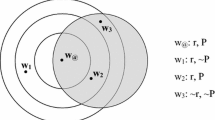Abstract
In this article we formalise the notion of knowing a secret as a modality, by combining standard notions of knowledge and ignorance from modal epistemic logic. Roughly speaking, Ann knows a secreet if and only if she knows it and she knows that everyone else does not know it. The main aim is to study the properties of these secretly knowing modalities. It turns out that the modalities are non-normal, and are characterised by a derivation rule we call Interpolation that is stronger than Equivalence but weaker than Monotonicity. We study the Interpolation rule and position it in the landscape of non-normal modal logics. We show that it, in combination with basic axioms, gives us a complete characterisation of the properties of the secretly knowing modalities under weak assumptions about the properties of individual knowledge, in the form of a sound and complete axiomatisation. This characterisation gives us the most basic and fundamental principles of secretly knowing.
Similar content being viewed by others
Data Availability
Data sharing not applicable to this article as no datasets were generated or analysed during the current study.
Change history
05 April 2023
A Correction to this paper has been published: https://doi.org/10.1007/s10472-022-09825-y
References
Abadi, M.: Logic in access control. In: 18th Annual IEEE Symposium of Logic in Computer Science, 2003. Proceedings., pp 228–233. IEEE (2003)
Abadi, M., Burrows, M., Lampson, B., Plotkin, G.: A calculus for access control in distributed systems. ACM Trans. Program. Lang. Syst. (TOPLAS) 15(4), 706–734 (1993)
Aceto, L., Ingolfsdottir, A., Sack, J.: Resource bisimilarity and graded bisimilarity coincide. Inf. Process. Lett. 111(2), 68–76 (2010)
Ågotnes, T., Wáng, Y.N.: Group belief. J. Logic Comput. 31 (8), 1959–1978 (2021a)
Ågotnes, T., Wáng, Y.N.: Somebody knows. In: Bienvenu, M, Lakemeyer, G, Erdem, E (eds.) Proceedings of the 18th International Conference on Principles of Knowledge Representation and Reasoning, KR 2021, pp 2–11 (2021b)
Apt, K.R., Wojtczak, D.: Verification of distributed epistemic gossip protocols. J. Artif. Intell. Res. 62, 101–132 (2018)
Apt, K.R., Grossi, D., van der Hoek, W.: Epistemic protocols for distributed gossiping. arXiv:160607516 (2016)
Attamah, M., Van Ditmarsch, H., Grossi, D., van der Hoek, W.: Knowledge and gossip. In: ECAI, pp 21–26 (2014)
Attamah, M., van Ditmarsch, H., Grossi, D., van der Hoek, W.: The pleasure of gossip. In: Başkent, C., Moss, L.S., Ramanujam, R. (eds.) Rohit Parikh on Logic, Language and Society, pp 145–163. Springer (2017)
Blackburn, P., de Rijke, M., Venema, Y.: Modal Logic, Cambridge Tracts in Theoretical Computer Science, vol. 53. Cambridge University Press, Cambridge (2001)
Craig, W.: Three uses of the herbrand-gentzen theorem in relating model theory and proof theory. J. Symbol. Log. 22(3), 269–285 (1957)
van Ditmarsch, H.: Dynamics of lying. Synthese 191(5), 745–777 (2014)
Fagin, R., Halpern, J.Y., Moses, Y., Vardi, M.Y.: Reasoning about Knowledge. The MIT Press, Cambridge, MA (1995)
Fan, J., Wang, Y., Van Ditmarsch, H.: Contingency and knowing whether. Rev. Symbol. Log. 8(1), 75–107 (2015)
Fong, P.W.: Relationship-based access control: protection model and policy language. In: Proceedings of the First ACM Conference on Data and Application Security and Privacy, pp 191–202 (2011)
Garg, D., Abadi, M.: A modal deconstruction of access control logics. In: International Conference on Foundations of Software Science and Computational Structures, pp 216–230. Springer (2008)
Hart, S., Heifetz, A, Samet, D.: “knowing whether”, “knowing that,” and the cardinality of state spaces. J. Econ. Theory 70(1), 249–256 (1996)
Lewis, D.: Intensional logics without iterative axioms. J. Philos. Log. 3(4), 457–466 (1974)
Pacuit, E: Neighborhood semantics for modal logic. Springer (2017)
Pauly, M.: A modal logic for coalitional power in games. J. Log. Comput. 12(1), 149–166 (2002)
Schotch, P.K., Jennings, R.E.: Modal logic and the theory of modal aggregation. Philosophia 9(2), 265–278 (1980)
Surendonk, T.J.: Canonicity for intensional logics without iterative axioms. J. Philos. Log. 26(4), 391–409 (1997)
Van De Putte, F., McNamara, P.: Neighbourhood canonicity for ek, eck, and relatives: A constructive proof. Rev. Symbol. Log, 1–17. https://doi.org/10.1017/S1755020321000319 (2021)
van der Hoek, W., Lomuscio, A.: A logic for ignorance. Electron. Notes Theor. Comput. Sci. 85 (2), 117–133 (2004). lCMAS 2003, Logic and Communication in Multi-Agent Systems
Acknowledgements
We are indebted to two anonymous AMAI reviewers, who helped us improve the paper significantly. We are grateful to Frederik Van De Putte for discussions about non-normal logics with (K) and for sharing the manuscript [23] with us. We also thank anonymous reviewers of the LAMAS 2020 workshop for valuable suggestions, and participants of the workshop for their comments.
Author information
Authors and Affiliations
Corresponding author
Ethics declarations
Conflict of Interests
Partial financial support was received by the first author by MOE Liberal arts and Social Sciences Foundation (project no. 20YJC7204002).
Additional information
Publisher’s note
Springer Nature remains neutral with regard to jurisdictional claims in published maps and institutional affiliations.
Rights and permissions
Springer Nature or its licensor (e.g. a society or other partner) holds exclusive rights to this article under a publishing agreement with the author(s) or other rightsholder(s); author self-archiving of the accepted manuscript version of this article is solely governed by the terms of such publishing agreement and applicable law.
About this article
Cite this article
Xiong, Z., Ågotnes, T. The logic of secrets and the interpolation rule. Ann Math Artif Intell 91, 375–407 (2023). https://doi.org/10.1007/s10472-022-09815-0
Accepted:
Published:
Issue Date:
DOI: https://doi.org/10.1007/s10472-022-09815-0



